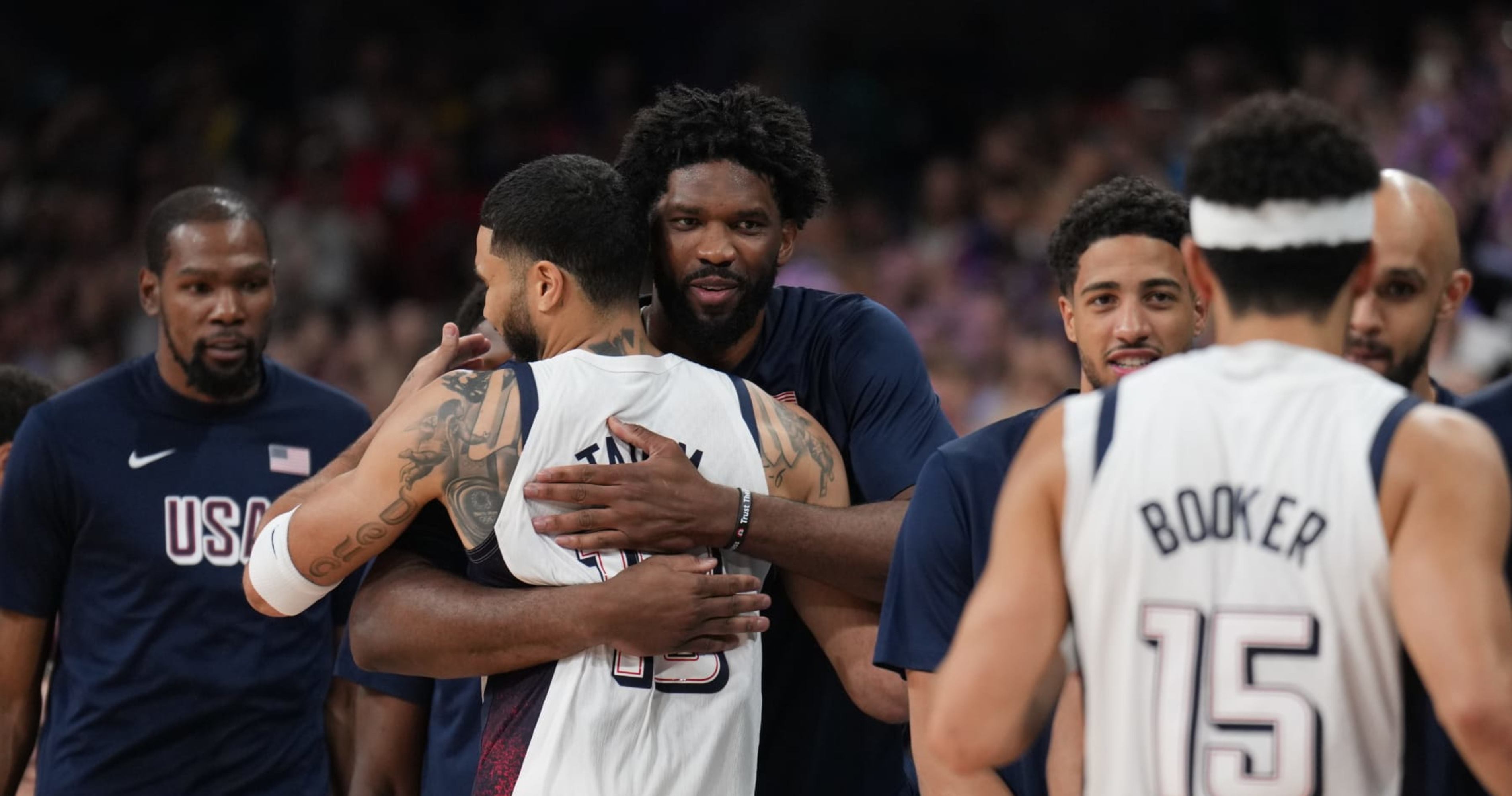World
Starting Lineup Change Spotlights Team USA’s Adaptability vs. South Sudan

Kevin Durant, Jayson Tatum, Joel Embiid, Tyrese Haliburton, Devin Booker and Derrick WhiteJesse D. Garrabrant/NBAE via Getty Images
On Sunday, the biggest story to arise from Team USA men’s basketball’s 26-point win over world No. 4 Serbia was a DNP-CD (“did not play, coaches decision”) for Jayson Tatum.
After the game, coach Steve Kerr said Tatum would get his opportunity, but that did little to quell the discussion online.
As it turned out, Tatum’s opportunity was the very next game, Team USA’s 103-86 win over South Sudan. Tatum started in place of Jrue Holiday, but that move was overshadowed by another.
Anthony Davis also started over Joel Embiid, something fans had been clamoring for for weeks (Embiid had a negative plus-minus in half this team’s games, when you count the lead-up exhibitions).
And then the 2023 NBA MVP, who’d been in USA’s starting five in every game he’d played for it, proceeded to sit on the bench for the entire South Sudan contest.
The easy reaction to either coaching move might be to nitpick the individual games of Tatum and Embiid. Both process the game a little differently than the rest of the roster. Those two and Anthony Edwards take a bit more time to choose between shooting, passing or attacking than the rest of the Americans. The difference, at least to this point, is that Edwards’ eventual probing has broken down defenses and often led to baskets.
Embiid and Tatum, on the other hand, have a tendency to linger in the triple-threat position a half-second or so longer. And while that may not sound like much, for a coach who’s long emphasized ball and player movement, it can be just enough to disrupt the rhythm Kerr is trying to establish.
Even in their individual starts, Embiid had four points in 11 minutes, while Tatum went for four in 17 minutes. The ball-popping offense Kerr prefers has made others, including non-All-Star Derrick White, look better on this international stage.
The more important takeaway, though, is what these coaching adjustments say about the roster in general.
Despite some of the controversy that surrounded the assembly of this team, and with apologies to Jaylen Brown, Grant Hill and company couldn’t have put together a much better collection of American talent for the Paris Olympics.
And that’s not simply a nod to the total, raw talent on the team.
Most of these players fit together seamlessly. The ones who may not be ideal fits haven’t fussed about limited minutes. And the aggregate versatility of all 12 makes it easier to adjust to individual matchups (even if those adjustments lead to a lot of online hand-wringing).
Serbia is one of the best national teams in the world, thanks mostly to the fact that it boasts the best individual player in the world. That player, Nikola Jokić, is a bruising, 6’11” center who can handle just about any minute load while being his team’s lead playmaker.
Being able to deploy three different centers, all of whom are All-Defense caliber defenders, at least gives the Americans a chance to bother Jokić.
South Sudan, on the other hand, plays a much faster, up-and-down game. They have plus athletes at seemingly every position. They can switch defensively and emphasize getting up threes.
Countering that requires more speed and defensive switchability, two attributes where Tatum has the edge over Embiid. Hence, the simple switch of those two for Wednesday’s victory.
We came into these games talking an awful lot about the teams that might have a chance to dethrone the Americans, who’ve won every Olympic gold in men’s basketball since they fell short in 2004. There was plenty of chatter about the world catching up. And relative to prior Olympics, that’s still true.
Some of the very best basketball players in the world—including Jokić, Giannis Antetokounmpo, Shai Gilgeous-Alexander, Victor Wembanyama and Franz Wagner, just to name a few—are in action for non-American teams.
But despite all the wishcasting for a more competitive tournament, Team USA is 2-0 through two games. One of those wins came against the fourth-ranked team on the planet. And their aggregate point differential is plus-43.
LeBron James is moving impossibly well for a 39-year-old playing at this level. Kevin Durant is tightening his grip on the title of best Olympic basketball player of all time. Everyone else, including those who’ve had to sit more than expected, are fulfilling their roles about as well as could be expected.
Real challenges may still be on the horizon. Heck, they probably are. Since that letdown in 2004, Team USA has faced real threats for the gold in just about every international tournament.
But as we approach the end of group play, it’s pretty obvious that this is the best, most versatile and most malleable team in the field.










